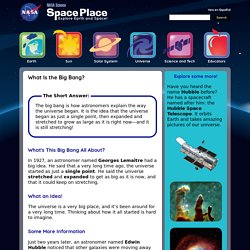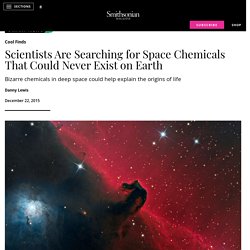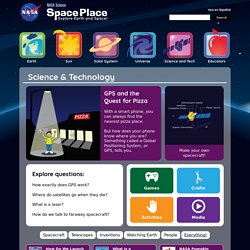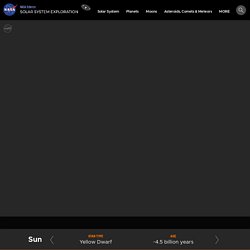

Pluto Gets the Call - Bing video. NASA’s Eyes. Do-It-Yourself. Google Moon. What Is the Big Bang? The Short Answer: The big bang is how astronomers explain the way the universe began.

It is the idea that the universe began as just a single point, then expanded and stretched to grow as large as it is right now—and it is still stretching! What's This Big Bang All About? In 1927, an astronomer named Georges Lemaître had a big idea. Scientists Are Searching for Space Chemicals That Could Never Exist on Earth. Every molecule in the universe vibrates in its own particular way, depending on how its atoms are arranged.

By studying the electromagnetic radiation stars and nebulas emit, astronomers can extrapolate all kinds of information from millions of miles away, down to their chemical makeup. As is turns out, the seemingly countless combinations of chemical compounds found on Earth are just a tiny fraction of what scientists are finding in space. Shared Sky: Indigenous astronomy art. Science And Technology. How Do We Launch Things Into Space?

You need a rocket with enough fuel to escape Earth’s gravity! What Is a Gravitational Wave? How do gravitational waves give us a new way to learn about the universe? Solar System. Color Your Universe: Find the... Can you find all the NASA and space-themed hidden objects? Play Why Do We Care About Water on Mars? Where there are signs of water, there might also be signs of life! Explore What Is an Impact Crater? Learn about impact craters! Sun. Overview Our Sun is a 4.5 billion-year-old star – a hot glowing ball of hydrogen and helium at the center of our solar system.

The Sun is about 93 million miles (150 million kilometers) from Earth, and without its energy, life as we know it could not exist here on our home planet. The Sun is the largest object in our solar system. The Sun’s volume would need 1.3 million Earths to fill it. Its gravity holds the solar system together, keeping everything from the biggest planets to the smallest bits of debris in orbit around it.
National Geographic - Bing video. Movements of the Earth. A Time-Lapse of the Night Sky. Interesting Trivia and Quiz Questions About Space. Solar System Video - Bing video. Astronauts Answer 50 of the Most Googled Space Questions. Solar System Video. Solar System - Planet Movement Animation. NASA Science - Solar System Exploration. Our Solar System Video Teaching Resources. Our Solar System Curriculum Karaoke Students read, sing and learn about important facts about our solar system.

This curriculum-aligned song targets outcomes of curriculum documents and supports and integrates classroom learning across key subject areas. Imagine This - What is astronomy? Hubble - Space art. How Hubble works. Why is Pluto not a planet? The 1995 Hubble photo that changed astronomy.